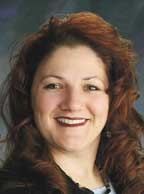A woman's plan for independence whatever turn life takes
By Gina M. Barry, Esq.
Partner, Bacon & Wilson. P. C.
Special to PRIME
Women age 65 and above are more than twice as likely as men to be unmarried widowed, divorced, separated, or never married - and to live alone. In 2004, the median income of unmarried women aged 65 and older was approximately $17,363 per year. The average age of a widow is 56 years. The national average total of widow compensation from all resources, including insurance, savings and pensions, upon her husband's death is approximately $12,000. These are very grim statistics, and the single most important contributing factor is inadequate preparation.
The glass ceiling hurts older women
Even today, women earn only $0.76 for every dollar that a man earns. This reduced income results in lower total compensation over a woman's lifetime, which detrimentally affects the amount of Social Security and company sponsored pension plan benefits she will receive upon retirement. Retirement benefits are often further reduced by the time that women typically take off throughout their child bearing and rearing years.
Since women live an average of eight years longer than men, and they characteristically have significantly less financial assets, this creates many hardships at a time when life should be easier. All women must take responsibility for their own financial well being, and the earlier this responsibility is undertaken, the better. A widow who has not exposed herself to financial issues and who must suddenly assume responsibility for her household's finances will be understandably overwhelmed.
On the other hand, a woman who is familiar with her assets and liabilities will make a more comfortable transition if necessary.
Know your family assets
Women should know the location of pertinent financial paperwork, including insurance policies, real estate deeds, mortgages, stock certificates, bonds, and brokerage account and annuity statements. Women should also take the steps necessary to understand the documents. Further, an emergency fund sufficient to cover three to six months of household expenses should be established. Establishing an emergency fund ensures that a setback, such as death of a spouse, unemployment, disability, uninsured medical expenses, or the need to repair or replace a major appliance or car, will not cause bankruptcy.
The divorce factor
Similarly, divorce is emotionally draining and usually a source of financial devastation to women. The number of middle age divorces has risen in recent years. Many older divorced women have been married for many years and have not worked or continued their education. They are likely displaced homemakers who have not participated in the workforce since before having their children. They are typically unskilled, untrained and unprepared for today's better-paying opportunities.
As such, it is advisable for all women to stay familiar with basic business skills and trends. Further, during a divorce, women must take a firm stand for the protection of their financial security. Although state law largely determines property settlements, women should obtain advice from professionals who fully understand all of the available options for securing their support, including social security and pension benefits entitlement.
Take care of your own money
It is also important for a woman to establish her own finances to the extent possible. The earlier women start putting money away for their retirement years, the better chance they will have of living comfortably at that time.
Whenever available, women should take full advantage of any company sponsored retirement plans, and if this is not possible, IRAs and other options must be considered and implemented. The goal is to start this planning as early in life as possible, but even older women can make contributions that will pay off when they need income later in life. Further, a woman should ensure that she establishes credit in her own name so that if she is later divorced or widowed, she will be able to obtain any needed credit in her own name.
Plan your own estate
Another critical step toward maintaining independence is establishing an estate plan. Unfortunately, many women are frightened by the thought of themselves or their spouses becoming incapacitated or passing away, so they refuse to address the reality that most women do in fact end up spending time alone. The act of drafting a Will forces a woman to review her financial situation, including assets and liabilities, which enhances her knowledge of her personal financial situation.
As described above, women are at a disadvantage regarding financial security throughout their lifetime. If they balk at making financial decisions, hard times will likely befall them if they must face life alone.
Without proper planning in place, divorce or the death of a spouse can financially devastate a woman. The ticket to independence is proper planning and education. Women must understand their assets and liabilities and have a strategy in place that will maintain their style of living if they are widowed or divorced.
Retirement and estate planning are critical factors that can make the difference between tough times being just emotionally draining, or both emotionally and financially draining.
Gina M. Barry is a Partner with the law firm of Bacon Wilson, P.C., Attorneys at Law. She is a member of the National Association of Elder Law Attorneys, the Estate Planning Council, and the Western Massachusetts Elder Care Professionals Association. She concentrates her practice in the areas of Estate and Asset Protection Planning, Probate Administration and Litigation, Guardianships, Conservatorships and Residential Real Estate. Gina may be reached at (413) 781-0560 or gbarry@baconwilson.com.
